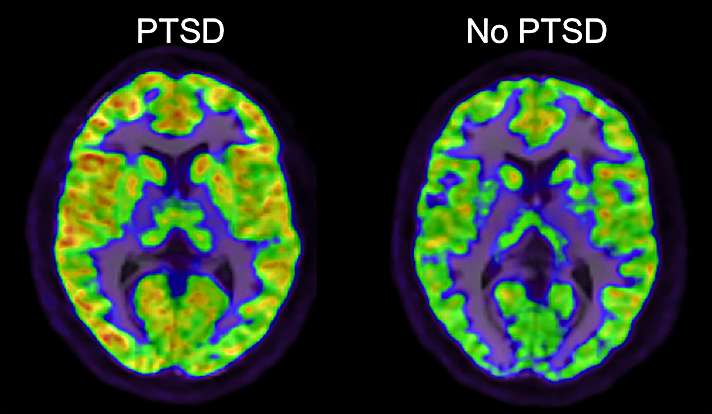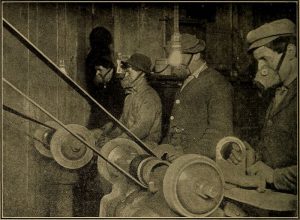Winner of the Fall 2018 StMU History Media Award for
Best Article in the Category of “Military History”
Best Article in the Category of “Science & Technology”
Charles Meyers, a Medical Officer, introduced the term “Shell Shock” to explain symptoms of Post Traumatic Stress Disorder (PTSD) displayed by military after combat in World War I (WWI). Soldiers often experienced symptoms including fatigue, tremor, confusion, nightmares, impaired sight, and impaired hearing. Meyers assumed that these symptoms were caused by the soldiers’ exposure to exploding shells, not necessarily the trauma they were witnessing or going through. In these years, symptoms of widespread PTSD were considered “weak” traits for soldiers by their colleagues and bosses. Even society as a whole started to view these symptoms negatively, which led to the destruction of their relationships after the Shell Shocked soldiers arrived home.1
Military gave Shell Shock victims no sympathy. When soldiers were dismissed from their duties, they were given labels such as “cowardice” or “emotionally weak.” These labels led to soldiers being targeted for abuse from their own side, as well as mock trials in which they were convicted. The pardons they received weren’t honorable, so they were often ashamed of their disorder, which led to more mental issues among the soldiers like depression, anxiety, and even suicide.2

New treatments flipped understandings of how World War I caused drastic changes in the behaviors of these men. Treatment for Shell Shocked victims before Arthur Hurst’s “miracle treatments” were very harsh, as they were often treated with Electroconvulsive Therapy, emotional deprivation, shaming, and solitary confinement. Some of the lesser treatments were hypnosis, massage, rest, and dietary treatments.3
Arthur Hurst primarily used occupational therapy to treat Shell Shocked patients, treating them as humanely and sympathetically as possible. This dignified care allowed for the increased numbers of “saved” soldiers, as they found ways to overcome the abuse and the labels given to them after their dishonorable discharges. Hurst’s treatments became iconic after the Newton Abbott’s Seale Hayne in Devon. Hurst’s approach allowed for 90% of Shell Shocked soldiers to be cured after only a single session.4

Modern day treatments, consist of therapy, as well as new medicines that aid in the control of the symptoms. According to Michael James, a pharmacist, there are Selective Serotonin Reuptake Inhibitors (SSRIs) that block the re-uptake of serotonin in the brain and help with sleep disorders, nightmares, and decreases intrusive thoughts. James also informed me that Serotonin Norepinephrine Reuptake Inhibitors (SNRIs) block the re-uptake of serotonin and norepinephrine in the brain which also decrease intrusive thoughts and provide aid for sleep disorders and nightmares.5
Hurst’s approach led to a change of heart and a consensus to the overall approach by society as a whole. Now, Veterans Affairs, also known as the VA, has a large program that provides aid to veterans with PTSD. However, this evolution of PTSD has not only been beneficial to veterans, but it has also allowed for a more diverse diagnosis of PTSD, in which it is more understood that other people, in addition to veterans, can also experience PTSD. PTSD can be caused from any sort of trauma including car accidents, violent crimes, and domestic violence. Individuals can even develop PTSD from having someone important abandon them as well. The DSM-5 has set a variety of symptoms for PTSD because just like any other disorder, it affects every individual differently. This document allows all individuals to gain access to the tools and help they need to recover from or live with PTSD.6

- Caroline Alexander, “The Shock of War,” Smithsonian Magazine, September 2010, https://www.smithsonianmag.com/history/the-shock-of-war-55376701/. ↵
- “Shell Shock,” BBC Inside Out, March 3, 2004, http://www.bbc.co.uk/insideout/extra/series-1/shell_shocked.shtml. ↵
- “Electroconvulsive Therapy: A History of Controversy, but Also of Help,” The Science Explorer, January 13, 2017, http://thescienceexplorer.com/brain-and-body/electroconvulsive-therapy-history-controversy-also-help; “Arthur Hurst: The Man Who Filmed Shell Shock,” BBC Radio 4, http://www.bbc.co.uk/programmes/articles/4VqPtrjsgcPKtgmYc2M5vXz/arthur-hurst-the-man-who-filmed-shell-shock. ↵
- “Arthur Hurst: The Man Who Filmed Shell Shock,” BBC Radio 4, http://www.bbc.co.uk/programmes/articles/4VqPtrjsgcPKtgmYc2M5vXz/arthur-hurst-the-man-who-filmed-shell-shock. ↵
- Email with Michael James, September 11, 2018. ↵
- Pete Walker, From Surviving to Thriving (Scotts Valley, CA: CreateSpace Independent Publishing Platform, 2013), 13-14. ↵


160 comments
Greyson Addicott
The evolution of “shell shocked” to “PTSD” seems to be a great one. There was, of course, a time when our ancestors would storm beaches, swords and shields in hand, to do battle with the enemy over land or resources. They were forced to not only witness the death of their friends, but also to endure countless injuries along the way. However, for many of them, that was just the status quo. Going home to their families was so important to them that they simply put the specifics of battle behind them. This attitude stands in stark contrast to the warriors of today, who have little to return home to save financial debt and depression.
Lyzette Flores
In my opinion, I see why the people would call our soldiers cowards for having PTSD. PTSD was not a coming thing as it is in today’s world. I guess they believed they were being cowards because they were looking for an excuse to not go back to war. Obviously, that was not the case. PTSD is a serious mental issue and it should not be ignored nor laughed at. Great article! I had no idea those issues used to happen back then.
Angel Torres
I am glad that society has shifted away from viewing or naming soldiers coming back from war with PTSD as cowards or any other word that is demeaning. Soldiers during that time were getting the worst of both worlds, they we’re not only suffering from PTSD but also had to endure prejudice from the public. The article could’ve have benefited from more detailed information, however, it was well written and very informative.
Luke Lopez
This was a very informative article on PTSD. It is terrible that soldiers, when they came back from war and experienced PTSD, were called cowards and weak. It is good that Hurst treated his patients that had PTSD as humanely as possible, and he did not use electroconvulsive therapy on his patients. Overall, this was a great article that went into detail on PTSD.
Adrian Cook
There are a lot of factors that take effect on one’s brain which can lead to permanent damages. Nobody should be labeled weak or a coward because of their time and effort serving the country. These men were exposed to very dangerous obstacles and constant acts of violence or something you just don’t see everyday. This can take a big tole on someone’s head and life and may never be the same again. PTSD is very serious and can effect everybody in it’s own ways. A very well written article that I enjoyed reading.
Sienna Guerra
This article was very well written and was interesting. Individuals with PTSD come from war and receive treatments. It is very nice to see that PTSD occurs and the story of transition is incredible. It is shocking how shocking and invasive and harsh the techniques were. I am relived on how much these techniques helped and impact the techniques were but heart breaking how much it hurt them at the same time!
Daniela Cardona
Research is extremely important to our development, and I think this article is a great testament to that. If people hadn’t taken the time to research and discover more about PTSD, efficient and safe treatments would have never been discovered and many people would have lived miserable lives. Knowing now that PTSD is very serious, and arises from seeing horribly unimaginable things that no one should ever have to know, it is sad to think the affected were though of as weak and just continued to be treated poorly. I am so glad for the information we have now and I hope we continue to research and discover more treatments and cures for more diseases.
William Rittenhouse
This was an amazing article and I really loved the title. It acuratley portrays how troops were thought of during this time. This was a rough time for the USA. A lot of people were doing drugs and supposedly spreading love as well as Aids through the whole movement, but no love was given to the troops. It wasn’t even the troops fault either. Troops don’t declare war it’s Congress that does that. Our troops fought a war that no one wanted and experienced some messed up shit over there then came back and were hated. This defenetley added to the PTSD that they already had.
Natalie Thamm
This was a really interesting article, though it is heartbreaking to hear how poorly those suffering from PTSD were (and sometimes still are) treated. Reading about the methods employed by Arthur Hurst were pretty shocking as they sound to be very invasive and incredibly harsh, but with 90% success, I do wish that there had been a little more information on this.
Max Lerma
This was a well written and very interesting article. I have known individuals who came back from war and received treatment for PTSD. I think it is appalling that at one point in time the general public and even the military felt that these individuals were cowards. They are anything but cowards. I am happy to see that this shift in thinking about PTSD has occurred and I am glad that you shared the story of its transition.